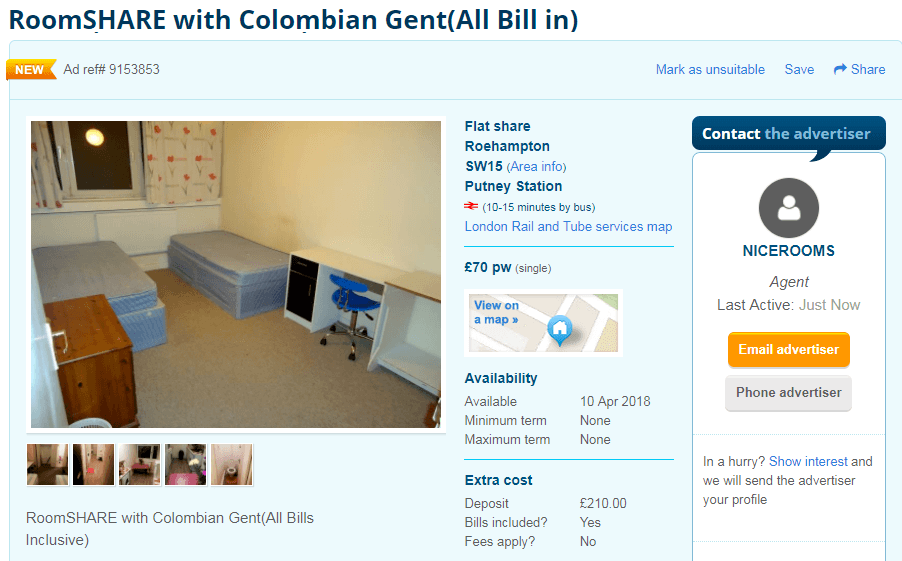Some online adverts target homeless people, offering accommodation in exchange for sex. Credit: Charlotte Zink/dpa

We all know the cost of housing is sky-high in global cities like London and New York, but the affordability crisis extends way beyond that. All over the world people who can barely afford it are looking for somewhere to live. And online sites like Craigslist are helping crooked landlords and scammers to rip off vulnerable tenants. It’s desperate need meets unscrupulous greed.
Cutting out the Middle Man?
Since the early days of the internet, it’s seemed the ideal place for people to rent (and buy/sell) their homes. That’s partly as the process of working with an agent is time-consuming, and partly because it’s costly. What better market for cutting out the “middle man”?
Of course, would-be renters faced challenges back in the days of postcards in newsagents’ windows. But the internet has made everything a whole lot easier for the needy and the greedy alike.
Which is particularly the case in today’s tight markets, where the combination of constrained supply, urgent need, and limited funds can create a perfect storm of gullibility on the part of people desperate for an affordable home.
The more desperate the customer, the easier to scam – and sometimes the unscrupulous come up with fiendishly smart schemes.

Rent boys – and girls – in Britain
The greedy are usually after money. But sometimes, they’re after sex. Last year the BBC reported that online classified ads were targeting vulnerable people for sex in exchange for accommodation. It’s a story to shock:
“One student described how she felt her only option was a “sex-for-rent” deal.
She said she had fled an abusive home and had nowhere to live.
‘He took me into his living room, got me drinks, and then after that it was just straight upstairs and go for it.'”
In a separate article, the BBC told the story of Jason, a 27 year-old homeless man who says he “had to enter a ‘sex-for-rent’ arrangement” to get off the streets:
“I found an advert [online] that offered a room for rent between zero and £300 per month. That was the first clue.”
A year after the BBC investigation, The Guardian has reported that the accommodation-for-sex trend is on the rise: “Words such as ‘intimacy’ and ‘benefits’ are starting to appear in the to-let columns [online].” And the article notes that there have been no prosecutions.[6. The Guardian article discusses whether such ads are illegal under UK sexual offences law. Meanwhile, in the United States, the recent passage of sex trafficking legislation by Congress has led Craigslist to drop “personal” ads seeking relationships from their U.S. site.]
A fake landlord in Munich
Then there are the scammers who aren’t landlords at all – where apartments are advertised, rent requested in advance, but the property doesn’t exist. Munich, for example, is famous for its high property prices, so when Klaus found a bargain online he lost no time in emailing the UK-based owner. Here’s the reply he received:
Dear sir/ms
My name is Peter Shaw I have the 1 room apartment in Munchen for rent. The rent is 350 EUR per month.
I had the apartment with my wife because she was german and last year she died in a car accident that we had . I also lost my hearing in the accident. Now I live in London United Kingdom. The apartment is very big due the fact that it is a one room apartment and it is in a nice area of Munhen. I have received another offers today about 50 proposals and I want yo to know that I only let the apartment if you pay in advance the rent for three months….
The key to the apartment is here with me. I will come and give you the key and we will make the contract.
And – surprise! – “Peter Shaw,” with his tale of woe, wanted the three months’ rent immediately. Klaus had the sense to Google some of his phrases, and found he wasn’t the only one to come across Mr Shaw.
The fact “Peter Shaw” claimed to be in London while he scammed in Germany may have been significant. Apparently the UK police will only help trace scammers from outside the country if there’s more than 5,000 euros involved.[2. According to an article on the German website, focus.de, “The money is often transferred to Great Britain, explains the Frankfurt commissioner Bernd Osterloh. Then it is usually gone, because the British authorities help the German colleagues usually only from a fraud sum of 5000 euros in the investigation.”]
Depriving would-be renters of their heard-earned cash by advertising fake properties is a common trick in the rental scammer’s book, but perhaps even more worrying are the crooks that are really after your ID. They ask for a copy of your driving licence or passport and three months’ payslips as part of the rental application process and then open a bank account or get a credit card in your name.
Nightmare in Dubai
Here’s another high-priced rental market: Dubai. And another tale of woe. More complex, and much more costly. Bruno had moved with his family to Dubai for work. He searched online and found a flat just a bit cheaper than the going rate in a nice area. After viewing the apartment with the agent, he met with the landlord and agreed to pay a year’s rent up-front.
A few months later the actual owner of the property knocked on his door. Apparently the man he had “rented” it from was a scammer who had himself rented it from the owner – and whose cheques had bounced.
Rental Fraud is shooting up
For a view of the scale of the problem – and one way of combatting it – see this German website listing email addresses and websites that have been used for rental fraud.
The UK actually has a “national fraud reporting centre” to track what’s going on.
In 2015, the number of reports of rental fraud in the UK rose by around a third on the previous year, with Action Fraud, the national fraud reporting centre, recording 2,940 incidents.
In the first nine months of 2016, some 1,891 people said they had been the victim of rental fraud. The Telegraph also reports that 3,200 house hunters contacted the police regarding rental fraud in 2015, up by 44% on the previous year.
The Local Government Association, however, believes this is only the tip of the iceberg – claiming that just 5% of victims choose to come forward and report the issue. With many choosing not to do so because of embarrassment or fear they won’t be believed.
It’s estimated that fake landlords are generating around £775 million each year from rental fraud, with victims losing out around £2,400 on average.[4. As cited on the helpful website Homelet.co.uk.]
This grim scene leads to a grim observation: with few exceptions, the victims of these scams all over the world are poor people. That’s why they are especially vulnerable – desperation pushes people to take risks. What’s more, they are hardly a core constituency for any government. Where are the high-profile prosecutions of rental scammers to discourage others – and inform the renting public? The relentless government focus on owner occupation must be matched by a relentless focus on policing the low-end rental sector.










Join the discussion
Join like minded readers that support our journalism by becoming a paid subscriber
To join the discussion in the comments, become a paid subscriber.
Join like minded readers that support our journalism, read unlimited articles and enjoy other subscriber-only benefits.
Subscribe